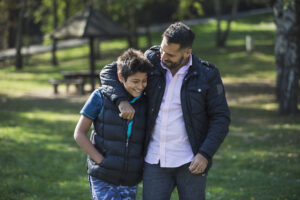It can be difficult to accept that you can’t change anyone except yourself. You will not be able to force a situation or person to be different, no matter how hard you try.
You can’t control people, places, or things.
However, you can control your response to someone or something.
When things around you feel chaotic, a knee-jerk reaction is to control your environment, including the people within it.
It can feel safe to judge, manipulate, and victimize so that you no longer feel powerless within a circumstance.
The truth is that you will be powerless over and over again, but you are not helpless.
By shifting your perspective from helpless to empowered, you can begin to accept what you can’t control around you, which is everything except yourself.
As a parent…
When you are a parent, you may want to control your children. It is easier to dictate and force solutions than accept that you are powerless.
When your children have ideas, issues, or problems they are facing; you may want to fix them rather than setting up a safe space for them to fail.

Instead of reacting with a solution to fix the problem, you can pause and listen.
Hold the space for your children to make mistakes so that they will not need you for everything.
It can be difficult to let go of being needed because it can make you feel wanted.
Unconditional love with your children is the goal.
When you set up the arbitrary guidelines of conditional love, you give children the expectation that they are always earning a reward.
You don’t need to have all of the answers in order to practice acceptance. You can learn alongside your children.
As a Partner…
When you are a partner, you may want to control your significant other. You are not a therapist, unless you are a therapist, so it is not your job to fix or provide guidance to solutions for the person you love.
Even if you are a professional therapist, your personal life can be separate from what you practice at work.
The goal is not to change someone else but rather shift your response. You may have to consider acceptance of the person or acceptance of the fact that the person is not right for you.
Going into relationships with the idea that you can change your significant other is setting yourself up for failure, unhealthy conflicts, and hurt.
Acceptance may mean that you take action for yourself.
As a Human…
You don’t have to be partnered or parenting to learn more about acceptance. Existing in the world can cause anxiety and loneliness brought on by a lack of control.
Rather than forcing solutions, you can accept that these emotions are part of life.
You will not feel happy all of the time, and if you do, you may need to accept that you aren’t growing and learning with risks in acceptance.
You may have the urge to control more of what is around you to help you feel safe. Instead, you can make yourself feel safe through acceptance.
Coming to Self-Acceptance…
Self-acceptance can be a challenge because it may not be your reality right now. You may have pain about who you are and who you want to be as a person.

Read More: “Learn How A Prayer Used In Addiction Recovery Can Help You Too”
You don’t need to have everything figured out. You can improve your mental health at any time by seeking support that best matches your needs.
Your current reality is only a temporary measure of your life.
Staying in the present moment, practicing meditation, acknowledging emotions including grief as well as anger, and allowing yourself to confront denial can help you learn to practice self-acceptance.
When you don’t practice self-acceptance; you may experience depression, sadness, failure, or suffering. Practicing acceptance with yourself can lessen difficulty in a relationship with a good friend or loved one.
Acceptance can be difficult but not impossible with these tips:
Presume Positive Intent.
Everyone is doing their best, including you. It may not seem like it, but accepting this notion can help you lessen judgement, manipulation, and forced solutions.
Being around others who don’t have the same beliefs as you can be difficult.
You have options in these circumstances including pause, remove yourself from the situation, listen, hold space, and deep breaths.
These practices can help you to make better decisions for your current situation. You will not agree with everyone and coming to a place of acceptance can help you to move forward rather than staying stuck in the same results.
Focus on Yourself.
When things around you start to feel chaotic, you may want to distract yourself with other people.
You are not in control of how people control a situation in their life; you are in control of your response. Interrupting the chaos of someone else is an unnecessary way to control.

Read More: “What Is Mindfulness And How To Be Mindful”
Quick connections through gossip, trauma-bonding, and love bombing with narcissism often fail.
Instead of inserting yourself into a situation to help, you can respond by asking yourself why it is important to you.
There is normally a reason you are enticed to solve a problem that isn’t yours.
By shifting the focus back to yourself, you can accept your situation and find freedom from old habits.
Listen.
Acceptance can happen when you listen and hold space for people without fixing, solving, or making things better. In fact, most people do not want unsolicited advice. They want to be heard.
It feels validating to be needed, but you are creating helpless behavior for yourself and others when you offer solutions rather than space for pain.
It can be difficult to listen to grief, sorrow, or another uncomfortable emotion.
If you don’t feel like you have the capacity to witness another person’s feeling, you can set a boundary. When you accept your limitations, you can empower yourself to help in unexpected ways.
Developing a meditation practice can help you to become a better listener as well. Two apps we like are Ten Percent Happier and Headspace.
When you begin to accept yourself, you may start to realize that you have less judgement toward others.
Often, the people in your daily life serve as a mirror. By reflecting on what you don’t accept in others, you can begin to explore what that means for you.
Sometimes, other people will make you feel uncomfortable, and that can mean it is time to look at yourself.
This can help you develop courage and wisdom when you begin to understand yourself better. If you feel resistance to breaking a habit, you may be getting a reward from it.
Compassion toward yourself can lead to acceptance, gratitude, happiness, and a new belief that you didn’t know was possible.
Learning self-acceptance is a journey and sometimes that journey can be hard to navigate alone. A Denver Metro Counseling, we believe that a core of growth and making changes in your life is acceptance. Through individual relationship therapy, we help people be in better relationship with themselves; in turn, leading to better relationships with others.
Contact us today to get started!
***
Written by: Randi Thackeray, MA
Clinically Reviewed and Edited by: Julie Reichenberger, MA, LPC, ACS, ACC



